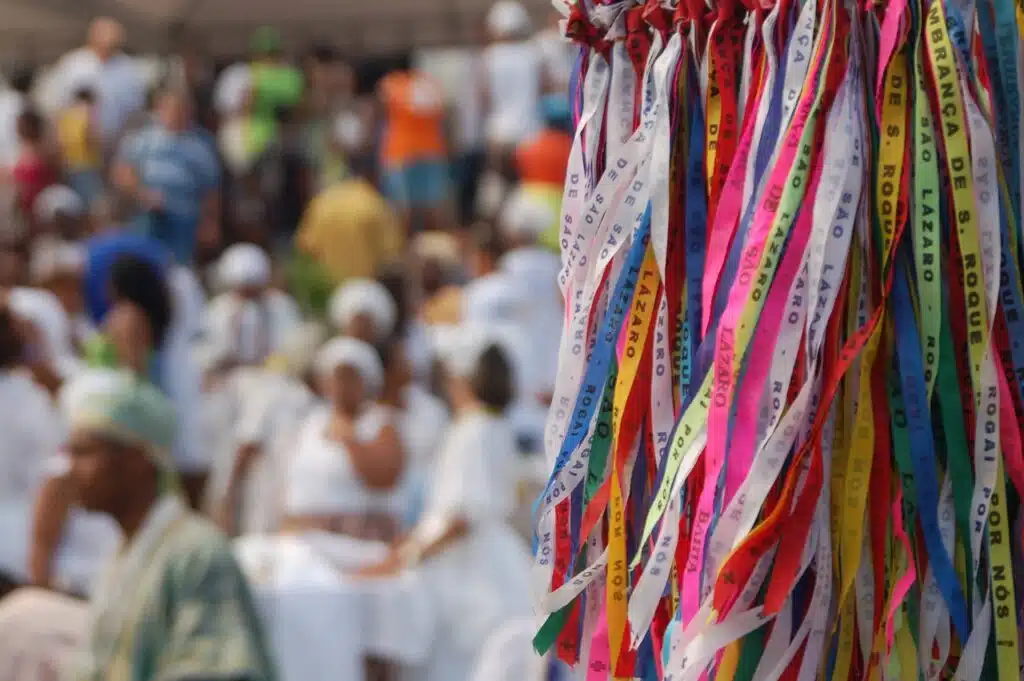The Afro-descendant religions in Brazil hold a profound and multifaceted significance, tracing their roots back to the early days of the African diaspora. As Africans were forcibly brought to Brazil during the transatlantic slave trade, they carried with them rich and diverse spiritual practices that evolved and adapted in their new environment. These religions stand today as a testament to the resilience and creative adaptation of African cultural heritage.
Key among these religions are Candomblé, Umbanda, and Quimbanda, each of which embodies unique rituals, beliefs, and organizational structures. Candomblé, for instance, maintains a strong connection to the Yoruba, Fon, and Bantu ethnic groups, incorporating their traditions into the worship of Orishas (deities). Umbanda blends African religious traditions with elements of Catholicism, Spiritism, and indigenous beliefs, reflecting a syncretic evolution influenced by Brazil’s multicultural landscape. Quimbanda, emerging in parallel, exhibits distinct practices often categorized under the darker aspects of spirituality.
The historical roots of Afro-descendant religions in Brazil are deeply intertwined with cultural preservation and resistance against colonial oppression. These spiritual systems not only provided a means of maintaining a connection to ancestral lands but also offered communal solidarity. Over time, these religions became woven into the social and cultural fabric of Brazil, contributing significantly to the national identity.
The fusion of African, Indigenous, and European influences gave rise to religious practices marked by vibrant ceremonies, music, dance, and art. This blending created a unique religious tapestry that continues to evolve. In contemporary Brazil, these religions maintain their relevance, offering profound insights into the nation’s past and ongoing cultural dialogues.
Historical Context: From Africa to Brazil
The transplantation of African-descended religions to Brazil is a complex narrative that traces its origins to the involuntary migration of millions of Africans during the transatlantic slave trade. Between the 16th and 19th centuries, Portuguese colonizers brought an estimated 4 to 5 million enslaved Africans to Brazilian shores. These individuals hailed from diverse ethnic groups, each with their own unique spiritual customs and beliefs.
Despite the profound servitude and systemic oppression they faced, these slaves carried their rich cultural and religious heritage with them. This acted as a resilient thread that tied them to their African homeland. They maintained their spiritual practices clandestinely, often syncretizing them with Catholicism, the predominant religion enforced by their colonizers. This syncretism was not only a way to preserve their own beliefs but also a means of survival under oppressive conditions.
Key African religious traditions, particularly those from the Yoruba, Bantu, and Fon peoples, began to evolve and adapt to the Brazilian context. Yoruba-derived religions, for example, played a significant role in shaping what would become known as Candomblé and Umbanda. These religions are not mere replicas of their African origins but are distinct, rich amalgamations formed under the unique socio-cultural fabric of Brazilian society.
The adaptation process involved a intricate blending of African deities, orishas, with saints in the Catholic tradition, resulting in a unique and complex spiritual landscape. Practices such as spirit possession, drumming, and dance, which are integral to these religions, continued to thrive despite prohibitions. These practices fostered a deep sense of community and provided the enslaved Africans with spiritual solace and a sense of identity.
As the African diaspora grew, so did the institutional and communal structures to support these evolving religious practices. Through resilience and adaptability, Afro-descendant religions in Brazil have not only survived but also thrived, influencing Brazilian culture, art, and social dynamics in profound ways.
Key Religions: Candomblé, Umbanda, and Quimbanda
The rich tapestry of Afro-descendant religions in Brazil showcases the profound synthesis of African heritage, Indigenous traditions, and Catholic influences. Among these, Candomblé, Umbanda, and Quimbanda stand out as principal religions, each contributing uniquely to the country’s religious and cultural landscape.
Candomblé
Originating among enslaved Africans, particularly from the Yoruba, Fon, and Bantu ethnic groups, Candomblé is a vibrant religion characterized by its deep reverence for nature and the pantheon of Orixás (deities). Each Orixá represents specific natural forces and human endeavors, such as Oxalá, symbolizing creation and leadership, or Iemanjá, the goddess of the sea. Candomblé rituals, known for their elaborate drumming, dancing, and singing, serve to honor these deities through ceremonies that often include offerings and animal sacrifices. The religion adeptly integrates African cosmology with Catholic iconography, reflecting a syncretic blend that allows practitioners to worship Orixás in the guise of Catholic saints.
Umbanda

Emerging in the early 20th century, Umbanda combines elements of Candomblé, Catholicism, Spiritism, and Indigenous religions, creating a unique spiritual practice. Its origins are attributed to the blending of Afro-Brazilian traditions with the teachings of Spiritism, brought to Brazil by French philosopher Allan Kardec. Umbanda’s pantheon is diverse, including Orixás from Candomblé, spirits of deceased people (ancestral spirits), and Indigenous spirits known as Caboclos. Umbanda rituals often involve mediums channeling these spirits to offer guidance and healing to practitioners. Unlike Candomblé, sacrifices are not typical in Umbanda; instead, the religion focuses on moral conduct and the balance of spiritual energy.
Quimbanda
Quimbanda, often perceived as the darker counterpart to Umbanda, is a religious tradition that focuses on invoking spirits known as Exus and Pombagiras, who act as intermediaries between the physical and spiritual worlds. Its practices are more focused on individual desires and personal empowerment, utilizing rituals that borrow from African, Indigenous, and European witchcraft traditions. Quimbanda’s ceremonies might involve offerings, spells, and other ritualistic practices designed to harness spiritual forces toward specific goals. This religion’s association with both protective and malevolent spirits has given it a complex reputation, highlighting the dual nature of its spiritual practices.
Each of these religions—Candomblé, Umbanda, and Quimbanda—plays an essential role in the spiritual lives of many Brazilians. They collectively illustrate how African, Indigenous, and Catholic traditions have uniquely interwoven to form distinctly Brazilian religious expressions, preserving the heritage and spiritual resilience of Afro-descendant peoples in Brazil.
Practices and Rituals
Within Afro-descendant religions in Brazil, the spectrum of practices and rituals is rich and deeply embedded in the cultural fabric. These traditions are manifested through a host of ceremonies, commonly infused with drumming, dancing, and the provision of offerings. Drumming and rhythmic percussion serve as the heartbeat of these practices, providing the vital energy that is believed to connect participants with the spiritual realm. The sound of drums is not merely musical but spiritual, creating a bridge to the divine.
Dance is another critical element that intertwines with drumming, constituting a physical form of worship and communication with deities. Each movement and step carries symbolic meaning and is often executed in trance-like states, indicating the presence of spiritual entities. Offerings, which typically include food, drink, flowers, and other symbolic items, are presented to honor these deities, seeking blessings and guidance in return.
Key figures within these religions include mediums and priests, who play essential roles in facilitating contact with the spiritual world. Mediums, often entering into trance states during rituals, serve as conduits for deities to communicate with humans. Priests, known as “babalorixás” (for men) and “ialorixás” (for women), are custodians of religious knowledge and traditions, guiding the community through both spiritual and practical aspects of religious life.
Festivals and religious gatherings form the cornerstone of community and faith among Afro-descendant religions. These events provide occasions for communal worship, cultural expression, and renewed spiritual vigor. Some ceremonies align with an annual calendar that marks key events, such as the “Festa de Iemanjá” (Festival of Iemanjá) and “Festa de Oxum” (Festival of Oxum), celebrating specific deities each with their own unique forms of reverence.
Overall, the practices and rituals within Afro-descendant religions in Brazil are characterized by a symbiotic relationship between the physical and spiritual realms, where every beat of the drum and every offering made are steeped in profound cultural and religious significance.
Places of Worship and Sacred Spaces
In the landscape of Afro-descendant religions in Brazil, places of worship, known as terreiros, play a crucial role. These sacred spaces are more than mere physical structures; they embody the living heritage and spiritual essence of the community. Terreiros serve as temples where rituals, ceremonies, and communal gatherings occur. They are meticulously arranged to reflect the symbolic cosmology and spiritual hierarchy of the respective religious tradition, such as Candomblé or Umbanda.
The design and layout of a terreiro are imbued with profound meaning. Typically, these sacred spaces include distinct areas for various deities, referred to as orixás in Candomblé. Each orixá has an assigned space adorned with specific colors, objects, and offerings that represent their unique attributes and powers. Central to these spaces is the altar, or peji, a focal point where the divine and the earthly realms converge. The arrangement not only facilitates worship but also reinforces the religious teachings and beliefs intrinsic to these spiritual systems.
Natural elements such as rivers, forests, and waterfalls also hold significant spiritual value in Afro-descendant religions. These natural sites are often viewed as extensions of the terreiros, regarded as abodes of deities and spirits. For instance, water bodies may be venerated as the dwelling place of Yemoja, the orixá associated with rivers and the sea. Rituals conducted near these natural elements are believed to invoke the presence and blessings of the spiritual entities connected to them.
Moreover, these sacred spaces and natural sites are essential in maintaining the cultural and spiritual continuum of Afro-descendant religions. They offer a tangible connection to the ancestral spirits and a medium through which the community can express their devotion. The significance of these spaces extends beyond religious practice, encompassing the preservation of cultural identity, heritage, and the continued transmission of age-old traditions. Through this integration of sacred spaces and natural elements, Afro-descendant religions in Brazil evolve as dynamic living traditions rooted in deep historical and spiritual foundations.
Challenges and Controversies
The landscape of Afro-descendant religions in Brazil has been punctuated by numerous challenges and controversies, both historically and in contemporary times. Practitioners have frequently contended with religious persecution, an issue deeply rooted in the colonial era. During this period, many African traditions were systematically suppressed by colonial authorities who deemed them incompatible with the dominant Christian norms. This suppression often forced communities to practice their faiths in secrecy, intertwining their rituals with Christian elements in a complex process of syncretism.
Syncretism, while a survival strategy, has often led to misconceptions and oversimplifications about Afro-descendant religions. For example, the blending of Catholic saint imagery with African deities has sometimes been misinterpreted as a dilution of African spirituality, rather than a resilient expression of cultural preservation. This misunderstanding continues to fuel debates within religious and academic circles about the “purity” and authenticity of these hybrid practices, contributing to ongoing controversies.
Racial discrimination exacerbates the difficulties faced by practitioners. Afro-descendant religions are inextricably linked with Brazil’s African heritage, and thus, they bear the weight of societal prejudices against Afro-Brazilian communities. This discrimination manifests in various ways, from social stigmatization to violent acts of intolerance. Such hostility is evidenced by instances of attacks on temples, derogatory remarks in public discourse, and obstacles in securing legal recognition for religious entities.
The predominantly Christian framework of Brazilian society further complicates the landscape for Afro-descendant religions. Despite constitutional guarantees of religious freedom, societal attitudes often reflect deep-seated biases. Christian exceptionalism sometimes casts Afro-descendant religions as “inferior” or “illegitimate,” undermining their rich traditions and cultural significance. Practitioners continually engage in battles for recognition, respect, and equal treatment, pushing against a backdrop of historical marginalization.
In the face of these challenges, the resilience and vibrancy of Afro-descendant religions showcase their cultural and spiritual significance. The ongoing struggle for acceptance in a predominantly Christian country underscores the need for broader societal dialogue and education, aiming to foster greater understanding and respect for Brazil’s diverse religious heritage.
Cultural Impact and Influence
Afro-descendant religions in Brazil have significantly influenced the country’s cultural canvas, embedding their essence deeply into various societal facets such as music, dance, art, language, and community identity. These religions, prominently including Candomblé and Umbanda, serve as conduits between the African roots of their practitioners and the vibrant, evolving culture of Brazil.
The rhythms and beats of Afro-descendant religions have seeped into Brazilian music, birthing genres like Samba and Afoxé. These musical forms, initially rooted in religious ceremonies and rituals, have transcended spiritual contexts to become quintessential elements of Brazil’s musical heritage. The poignant drums and rhythms not only retain the traditional vibes of African ancestry but also unify diverse Brazilian communities under a common cultural banner.
Dance, too, plays a pivotal role as an expressive extension of these religions. The movements in dances performed during rituals and celebrations convey narratives of deities, ancestors, and spiritual journeys. This has inspired various Brazilian dance styles, notably Samba de Roda and Capoeira, both of which integrate rhythmic patterns and symbolic movements tracing back to African traditions.
Artistic expressions within Afro-descendant religions, epitomized by elaborate altars, vibrant costumes, and intricate beadwork, have influenced contemporary Brazilian art. This visual culture enhances the aesthetic intricacies seen in festivals such as Carnaval, wherein artistic representations of deities and mythologies become a focal point of artistic display and communal celebration.
Additionally, the lexicon of Afro-descendant religions has permeated Brazilian Portuguese with specific terms and phrases that communicate spiritual and cultural concepts unique to these traditions. Words like “axé” (a greeting and term for positive energy) or “orixá” (deity) have been integrated into everyday language, reflecting the profound spiritual influence on social dialog and cultural understanding.
The sense of community fostered by Afro-descendant religions is another critical aspect. Terreiros (spiritual communities or temples) function not only as spaces for worship but also as cultural hubs. They facilitate the preservation and dissemination of ancestral knowledge, strengthen community bonds, and support social resilience and identity among Afro-Brazilians.
In essence, the cultural impact of Afro-descendant religions extends beyond the spiritual realm, enriching Brazil’s cultural diversity and vibrancy. By preserving and celebrating their heritage, these religions play an indispensable role in shaping a unique and inclusive Brazilian identity.
Future Outlook and Preservation Efforts
As Brazil continues to modernize and grapple with the forces of globalization, Afro-descendant religions face both challenges and opportunities. Efforts to preserve and promote these rich cultural traditions are multifaceted, involving community initiatives, educational programs, and legal protections. These efforts are crucial to ensuring that the heritage and practices associated with Afro-descendant religions remain vital and relevant for future generations.
Cultural preservation initiatives often spearheaded by community leaders and religious practitioners, aim to document, celebrate, and pass on the traditions and beliefs of Afro-descendant religions. Festivals, cultural events, and public ceremonies serve not only as expressions of faith but also as opportunities for wider society to engage with and appreciate these vibrant traditions. These events play a crucial role in fostering a sense of pride and identity among practitioners while educating the broader public about the significance of these religions.
Educational programs are also essential in the preservation efforts. Integrating Afro-descendant religious studies into school curriculums helps to cultivate an understanding and respect for these traditions among younger generations. Scholarly research and academic publications contribute to a deeper comprehension of the historical and cultural contexts of these religions, promoting a more inclusive narrative within Brazilian society. Universities and cultural organizations collaborate to offer workshops, lectures, and exhibitions, thereby creating platforms for knowledge sharing and intercultural dialogue.
Legal protections are another critical component. Legislation that recognizes and protects the rights of practitioners of Afro-descendant religions, such as the 1997 Brazilian law guaranteeing freedom of religious expression, is indispensable. These legal frameworks help safeguard the right to practice and propagate these religions without fear of discrimination or persecution. Advocacy groups and civil society organizations actively work to ensure these rights are upheld, often engaging in public policy debates and legal battles to defend religious freedom.
The future outlook for Afro-descendant religions in Brazil is one of cautious optimism. While modernization and globalization pose challenges, they also offer opportunities for these religions to adapt and thrive. The continued efforts in cultural preservation, education, and legal protection will be key in maintaining the vitality of these traditions. By fostering a deeper understanding and respect for Afro-descendant religions, Brazil can ensure that these invaluable cultural heritages endure and flourish in the 21st century and beyond.





